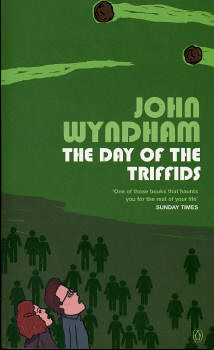
The Day Of The Triffids (1951) by John Wyndham
I could have sworn that I had read this book at some point when I was a teenager. It turns out that it must have been one of the other Wyndham books I'd read (probably The Midwich Cuckoos (1957) or Trouble with Lichen (1960)). Nevertheless, this book is often described as an essential of the post-apocalyptic genre and rightfully so.
Bill Masen wakes up in a hospital on the final day of recovering from getting Triffid poison in his eyes. Triffids are a plant that appeared on the planet several years prior to the start of the story. They are mobile, man-high plants that have a deadly stinger that can shoot out and kill with their poison. When processed, however, their oils are extremely healthy and they have farmed in giant pens where they can be staked to the ground.
On the last night of Bill's convalescence, there is a meteor shower whose strange green light leaves everyone blinded. Bill leaves the hospital in a scene that reminded me of the movie 28 Days Later. He is one of the very few left sighted and wanders London observing the chaos, death and destruction that blinding the entire population entails. The moral dilemma of whether to help the blind find food is a strong theme in the book and is revisited often. He eventually falls in with other sighted people and several attempts are made to forge ahead at creating a life in the new and awful world. A major conflict exists between those who believe that Judeo-Christian ethic must be maintained and others who want to rewrite the rules. Additionally, the Triffids are breeding and expanding across the land; killing with ease.
This novel (and I'm sure his other catastrophe books) form a clear bridge between early sci-fi by HG Wells and the P-A explosion of works through the 60's and 70's. In particular, his writing style and themes presaged the British authors who I have reviewed extensively on the Report (Ballard, Christopher, Priest, etc.). Wyndham sets up the societal collapse in a particular way to explore questions of what it means to create a new order.
'Man remains physically adaptable to a remakable degree. But it is the custom of each community to form the minds of its young in a mould, introducing a binding agent of prejudice. The result is a remarkably tough substance capable of withstanding successfully even the many innate tendencies and instincts. In this way it has been possible to produce a man who against all his basic sense of self-preservation will voluntarily risk death for an ideal - but also in this way is produced the dolt who is sure of everything and knows what is "right.'
He also uses the Triffids, I think, as a sort of environmental analog. Perhaps suggesting that human manipulation of crops, land or biology can create a monster that mankind will be unable to contain. The book's ending, while hopeful, leaves the reader unsure of mankinds ultimate ability to adjust to catastrophe.
This was an excellent book that I expect many people have read in school. I urge you to revisit it for a new viewpoint.

4 comments:
Great analysis. I'll definitely reread Triffids. When I first started reading your post, I had the same thought, " wait a minute, I'm sure I read Day of the Triffids, but now I'm not so sure." But as I went forward, more memories came back to me. I think I read it in 7th grade and I just didn't have any of the knowledge or background to appreciate it other than being a neat story.
I like the idea of the Wyndham being the link in the long chain of Post-Apocalyptic writers. It'd be interesting to find out what John Christopher or Ballard or any of those guys thought of Wyndham. They must have read him, as I'm pretty sure he was as popular in England as he was in Canada (I think Triffids might even have been a requirement in school).
And Wyndham's book are complex and interesting. He has a lot of commentary buried in them (as you suggest with the triffids as revenging nature idea) but it's buried deep and in weird places. Worth a lot of study I'm sure. Ack, another line of research!
Wow, I am definitly reading this one!
In my imagination everyone (or nearly everyone) disappears. Trippids is interesting to be because I haven't spent much time imaging everyone being rendered bliind and needing my help. I look foreward to thinking about the dilemma of whether or not to help.
I'm definitely going to be reading it too. I've made my 7th graders read Earth Abides and they don't really care for it. Maybe this one is more their style. I chose EA because it discusses the building of the state, when Ish and the Tribe have to make the law (rather than taking it into their own hands) and enforce it.
I do like EA because it is told from the Leader's perspective, we see Ish under the burden of leadership, using old models and modes of thinking, in opposition to the new needs and possibilities the Tribe recognizes as 'normal.'
EA is great and I'm definitely checking this one out too. I've enjoyed the Report this year for the P-A lit. Are you chosing a new theme for 06's books or just keepin on?
Hey, thanks for the feedback (all of you). I've been lucky to read quite a few books this year that, I felt, really worked.
I haven't thought much about a theme for next years reads. There are still a few P-A books I'd like to find: Pat Frank'sAlas Babylon, Algis Budrys' Some Will Not Die, Jacl London's The Scarlet Plague.
Thankfully, there is never a shortage of excellent books to read.
Post a Comment